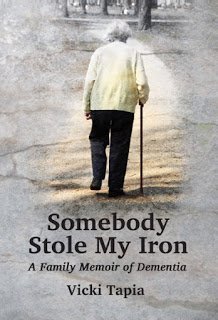Somebody Stole My Iron
My parents, *Trudy and Harry Anderson, had lived a long and fruitful life in *Nelson City and both expected to die there. As their decline became more and more worrisome, I begged the two of them to move closer to me for their own safety, but they adamantly refused. One icy winter, a bad fall and broken hip later, they acquiesced, leaving behind a lifetime of both the tangible: house, car, and belongings; and the intangible: the love of all their remaining friends and support of their church family.
Tragically, more onerous losses awaited. After Mom’s diagnosis of Alzheimer’s disease and Dad’s diagnosis of Parkinson’s-related dementia, I watched helplessly, as one excruciating memory at a time, the parents I’d always known, slowly disappeared.
Guilt, a constant companion, followed me, not only as I struggled to care for my parents, but to also nurture my new marriage; leaving me feeling I’d done justice to neither. Sorting out everything from how my father had lost his eyebrows to why my mother put comet cleanser into her shoes every morning, I sometimes felt I’d also fallen into the rabbit hole of dementia, right along with my parents. When Mom accused me of stealing their money to travel, I struggled to understand her escalating paranoia and learned neither reasoning, crying nor anger did anything to alleviate the situation. Mom “fired” me on several occasions, and I speak honestly when sharing I secretly wished it possible.
As a way to cope, I kept a journal. As time passed, it occurred to me that others traveling the dementia road might be able to benefit from what I’d learned along the way. That’s when my diary morphed into a memoir. And one truth I’ve learned stands out in my mind: how similar our stories are. There’s comfort in that. My goal in writing this memoir is to offer hope: We’re NOT alone.
Readers’ comments have been both positive and affirming. One reader shared she found this memoir “…A wonderfully true and honest account of surviving dementia. The way the stories are written, all ending with lessons learnt, is a real help to people like myself who are struggling to come to terms with the devastating truth that I am losing the man I love to this nightmare disease. Any help on this path is most welcome and this book, even at the end of a tough day, is an easy read.”
* Names changed to protect privacy
